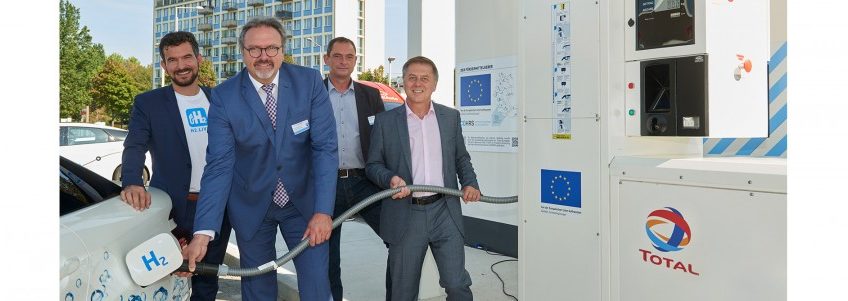The development of the H2 infrastructure in Germany is making good headway: Today, the first hydrogen filling station in Saxony was inaugurated at the TOTAL service station in Dresden on Wiener Straße. Dresden is one of the first 50 hydrogen (H2) service stations in Germany and an important contribution to enable eco-friendly electromobility for fuel cell vehicles.
The new hydrogen facility was built by H2 MOBILITY with support from the European Union. Stefan Brangs, State Secretary in the Saxon State Ministry for Economic Affairs, Labor and Transport, was able to announce a further step in the expansion of the hydrogen network during the ceremonial first filling of a fuel cell vehicle: In Leipzig, the next hydrogen service station has already been completed at the TOTAL truck stop in Poststraße.
The technology for the new hydrogen facility at the TOTAL service station in Dresden is produced by Air Liquide and has the refuelling capacity for up to 40 vehicles per day. The primary goal of the joint venture H2 MOBILITY, formed by the companies Air Liquide, Daimler, Linde, OMV, Shell, and TOTAL, is to operate 100 stations in metropolitan areas in Germany and along motorways and highways by 2019. Another 300 hydrogen filling stations will follow as the vehicle numbers are ramped up.
For the establishment of the hydrogen station in Dresden, H2 MOBILITY has received funding from the European Commission’s trans-European Transport Network (TEN-T CEF) within the project Connecting Hydrogen Refuelling Stations (COHRS). In the past years, the development of Germany’s H2 network had advanced significantly thanks to the Clean Energy Partnership (CEP), an association of industrial representatives of diverse sectors funded by the German government within the scope of the National Innovation Programme Hydrogen and Fuel Cell Technology (NIP). Within the framework of the NOW GmbH, the federal government is also an associated partner of H2 MOBILITY.
E-Mobility with Hydrogen Lowers CO2-Emissions
Eco-friendly electromobility using hydrogen causes no local pollutants or CO2 emissions and, thanks to short refuelling times and long ranges, offers a high level of driving convenience. Fuel cell vehicles can be refuelled in under five minutes with enough fuel for a reach of up to 800 kilometers.
Stefan Brangs, State Secretary in the Saxon State Ministry for Economic Affairs, Labor and Transport:
“To become modern and smart, cities must develop sustainable mobility concepts. Hydrogen from renewable energies – preferably produced in the region – is certainly a key technology for the electromobility of the future. Therefore, I am pleased to see that the white spots on the map in eastern and central Germany are slowly becoming smaller and that there are more and more public hydrogen filling stations. Because the establishment of a dense European network of hydrogen service stations is the basic prerequisite for more people switching to this type of drive.”
Bruno Daude-Lagrave, CEO of TOTAL Deutschland GmbH:
“As a pioneer in our industry, we have been active in the development of hydrogen mobility in Germany for 16 years. All the more reason for us to be pleased that the expansion of the H2 service station network is gaining momentum. We have only just reached an important milestone with the opening of the 50th German hydrogen station in Potsdam together with our partners from industry and politics, and now Saxony’s first hydrogen station marks another important step. Further projects at TOTAL service stations in Leipzig, Magdeburg, Erfurt and Neuruppin will soon enable ecofriendly mobility with hydrogen throughout eastern Germany.”
Markus Schewitza, Managing Director, Air Liquide Advanced Technologies GmbH:
“We need to face the challenges of energy transition now. And hydrogen is today one of our best solutions to achieve the objectives of the Paris Agreement. Hydrogen has notably the potential to efficiently decarbonize the transport sector which is one of the major sources of pollution in our cities, but it requires a dedicated infrastructure to achieve this goal. Air Liquide is proud to contribute, together with the key private and public players, to the building of the biggest hydrogen infrastructure in Europe, and thus enable the deployment of FCEVs on the territory.”
Nikolas Iwan, CEO of H2 MOBILITY:
„Hydrogen offers an electromobility solution without restrictions: dynamic acceleration, short refuelling times and ranges comparable to conventional cars. We are delighted that more and more hydrogen pioneers are taking advantage of our fast-growing service station network. There will be 100 stations by the end of 2019! Anyone who wishes, can follow our progress via our app H2.LIVE.”


